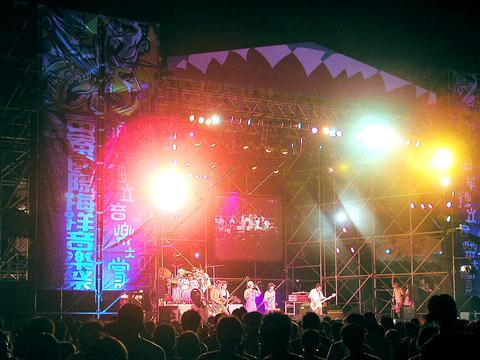It was during the last song by Monkey Insane (
Monkey Insane edged out 10 other bands that competed through the sweltering Saturday afternoon heat to walk away with the top honors in Taiwan's only music awards to recognize amateur bands that have yet to release an album.

PHOTO: MAX WOODWORTH, TAIPEI TIMES
The competition was hard fought, according to the judge panel, with exceptional sets put in by the other participating bands, especially Mango Runs, Spunka, Relax One (
Stone ended up walking away with the Jury's prize, while Mango Runs and XL together shared the Indie Music Award.
The competition is held as part of the three-day Ho-Hai-Yan festival, which began on Friday and continued yesterday with a lineup of bands from Taiwan and abroad.
"There are far more people this year than any previous year," said Zhang 43, head of Taiwan Colors Music, which organized the first two days of festivities. "We've never seen this many people out here for a show before."
Indeed, the popular beach-side town of Fulong took on a carnival atmosphere throughout the weekend as thousands of concert-goers flooded in from Taipei and beyond for the annual event. Students, young office workers and even families with grandparents and tots in tow flooded the beach, turning it into a patchwork of towels and pick-up games of beach volleyball.
In previous years the bands performing on both stages tended toward the garage-band style that could impress with their raw energy if not their musical abilities. This year, however, the bands were of remarkably higher caliber.
"All the bands are really tight compared with last year. They can all really play their instruments and put together a set of solid music," Zhang said.
The music was set to get even better yesterday when MTV took over the reins of the festival "to put on its own lineup of groups from Taiwan and abroad. By yesterday afternoon crowds were swelling on the beach again to catch local favorites Sticky Rice (糯米團) and to see the headliners Jaurim from Korea and the Perishers from Sweden.
By any measure the festival was judged by organizers and concert-goers alike to be a smashing success. Even traffic was kept under control in the town as a heavy police force restrained crowds from swarming the coastal highway and extra trains carried the throngs into and out of town without much hassle.

Taiwan has next to no political engagement in Myanmar, either with the ruling military junta nor the dozens of armed groups who’ve in the last five years taken over around two-thirds of the nation’s territory in a sprawling, patchwork civil war. But early last month, the leader of one relatively minor Burmese revolutionary faction, General Nerdah Bomya, who is also an alleged war criminal, made a low key visit to Taipei, where he met with a member of President William Lai’s (賴清德) staff, a retired Taiwanese military official and several academics. “I feel like Taiwan is a good example of

March 2 to March 8 Gunfire rang out along the shore of the frontline island of Lieyu (烈嶼) on a foggy afternoon on March 7, 1987. By the time it was over, about 20 unarmed Vietnamese refugees — men, women, elderly and children — were dead. They were hastily buried, followed by decades of silence. Months later, opposition politicians and journalists tried to uncover what had happened, but conflicting accounts only deepened the confusion. One version suggested that government troops had mistakenly killed their own operatives attempting to return home from Vietnam. The military maintained that the

Before the last section of the round-the-island railway was electrified, one old blue train still chugged back and forth between Pingtung County’s Fangliao (枋寮) and Taitung (台東) stations once a day. It was so slow, was so hot (it had no air conditioning) and covered such a short distance, that the low fare still failed to attract many riders. This relic of the past was finally retired when the South Link Line was fully electrified on Dec. 23, 2020. A wave of nostalgia surrounded the termination of the Ordinary Train service, as these train carriages had been in use for decades

Lori Sepich smoked for years and sometimes skipped taking her blood pressure medicine. But she never thought she’d have a heart attack. The possibility “just wasn’t registering with me,” said the 64-year-old from Memphis, Tennessee, who suffered two of them 13 years apart. She’s far from alone. More than 60 million women in the US live with cardiovascular disease, which includes heart disease as well as stroke, heart failure and atrial fibrillation. And despite the myth that heart attacks mostly strike men, women are vulnerable too. Overall in the US, 1 in 5 women dies of cardiovascular disease each year, 37,000 of them